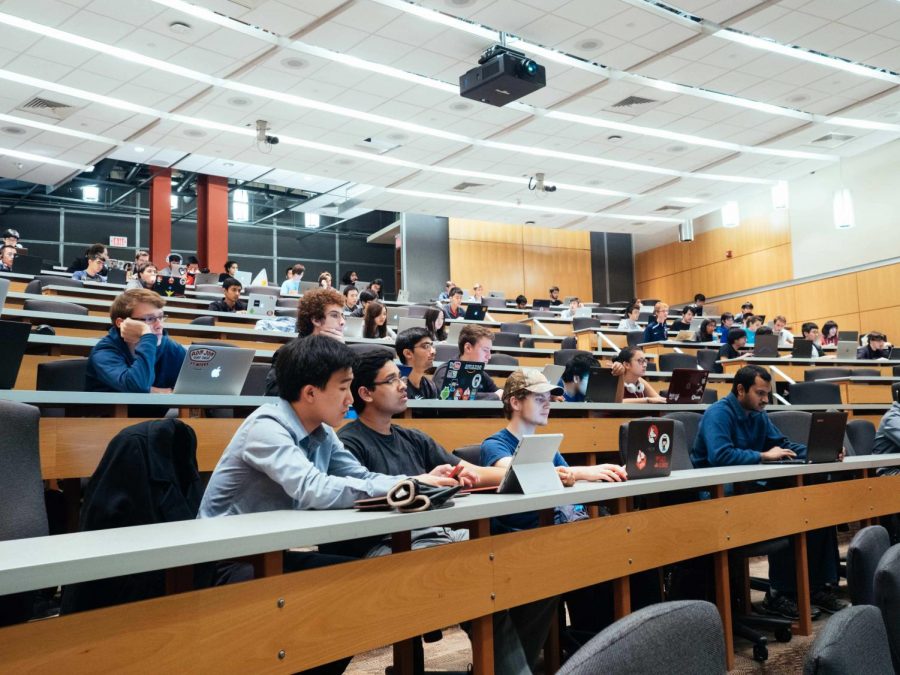Grand Challenge Learning classes enhance student classroom experience
October 25, 2017
This week, students were sent a notification about their time tickets for the spring semester registration, which means it is time to start planning new schedules.
Regardless of the major, choosing general education classes can prove to be a challenge for students. They may feel they are choosing gen-ed classes to satisfy major requirements without looking into courses that are interesting to them.
Grand Challenge Learning classes are experiential, meaning that students often get to go outside of the classroom.
“(Students) talk to guest speakers, work in the community and create documentaries,” Alaina Pincus, GCL project manager, said. “They do all sorts of things that are focused on driving home the subject matter.”
GCL 128 is a course that focuses on sustainability in fiction.
Get The Daily Illini in your inbox!
According to the course description, the class explores how narrative fiction focuses on sustainability, such as dystopian fiction about climate change and shaping the relationship that students have with the natural world. Along with other GCL classes, it is meant for first and second-year students.
One of the unique components of GCL classes is that they often include a common purpose.
Clara Bosak-Schroeder, professor of the Sustainability in Fiction course, organizes her lessons around community service.
“In the classroom, we read ancient texts and we write about them, but students also compare what they’re learning about in the ancient world with their own experiences as volunteers,” Bosak-Schroeder said. “Learning how organizations work by volunteering at them is a big benefit.”
In place of traditional assignments, she said she centers the coursework around reflective writing to encourage students to develop their own ideas about the environment and sustainability.
She wants students to describe experiences through other means. While this is a challenge for her, Bosak-Schroeder said she sees teaching the class as an opportunity to grow.
Although some GCL classes venture outside of the classroom, there are also large lecture courses taught by five different professors.
“(Professors) share responsibility for the lecture and every professor leads their own discussion section,” Pincus said. “You get to take a small class and work with a faculty expert, somebody who is really at the top of their game on campus.”
Another interesting aspect of GCL classes is that they are interdisciplinary, according to Pincus.
The courses bring together different ways of looking at a particular issue, whether that is law and politics, or sustainability in minority culture.
“The GCL courses focus on real-world, pressing issues,” Pincus said. “When you get out and interact with the world around you instead of just sitting in the classroom, you really see the impact of whatever it is you’re studying.”
Pincus said the issues studied are never going to go away and are very important, especially in the current cultural and environmental atmosphere. In the courses, students learn by doing, which can be eye-opening.
Jonathan Livengood, GCL professor, said it is valuable that his students come from all different backgrounds.
The different perspectives in the class add detail to class discussions, Bosak-Schroeder said. She also said it is important for students to think about the challenges society is facing.
“Having rich conversations with their classmates where they can debate is a benefit,” Bosak-Schroeder said. “It is important to not just think about (challenges) in a scientific perspective, but to see how environmental problems have changed over time.”
In terms of the career paths of students, she said it is helpful that they learn how to express themselves in writing, a skill students do not necessarily learn in a typical major. She also said students can build skills through service learning that they can bring to future jobs.
Bosak-Schroeder said in addition to gaining valuable skills, students will have fun in GCL courses.
“Prepare to have some of your deeply held assumptions about nature challenged, and your imagination of what it means to be human expanded,” Bosak-Schroeder said.
The University is experimenting with GCL classes. Pincus encourages students to take them in the spring semester because it is unclear if they will be offered next year.
“The pilot ends in Spring 2018, and getting more student feedback is vital,” Pincus said. “So, take the course. Don’t wait. Don’t miss the opportunity.”







